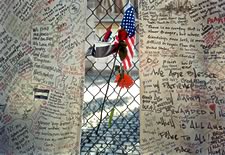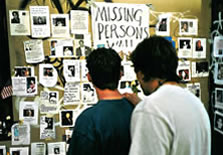As the images of President Bush proliferated on the television screens at the airport bar lounge, I envisaged a hall of mirrors in my mind, dissolving from one American foreign escapade to another as the ghosts of the Bay of Pigs, the Vietnam war, the debacle in Iran, the Grenada invasion, the backing and capture of Noriega, the embarrassment in Somalia and the bombing of the American barracks in Lebanon and Saudia Arabia meshed into a ball of fire that was now rolling toward the barren hills of Afghanistan that soon to be filled with a mixture of bombs and yellow packages of food descending from the sky like manna. The terms "good" and "evil" were repeated by an American president, echoing an entire cold war type of discourse and the promise of a "crusade" brought back the ghosts of the "civilized" world's colonial past. For a moment, President Bush even mistook the next war for a local fox hunt. He promised to smoke the bad guys from their caves, a strange comment coming from a man who for an entire day was whisked away to an underground hiding place because of the terrorist attack. Then, before the President's speech consultants started writing a finer style of prose for his speech in congress, which caused many newspaper columnists to declare that the 11th of September disaster hurled a new style of presidency, one still had a whiff of the local jargon in the newspaper: the page spread photograph of Usama Bin Laden as a wanted criminal in a Western turned the army units that were recruited into a posse.
The grandiosity of American society was clearly wounded and the president expressed it well when he explained his shock at being attacked at home. (Apparently a surprise that no other country could ever allow themselves the luxury of affording--where else do nations get attacked?). This sense of wounded pride that caused people to feel so vulnerable was manifested clearly on the fifth day of mourning, when I visited Union Square, which was filled with makeshift candle alters and scrolls that enabled people to express their sincere feelings. On the steps of the square stood a crowd around a woman who was dressed as the Statue of Liberty. Her entire body and face were colored green and the folds in her costume were very convincing. I arrived at the exact moment when she tired from her posture and needed to rest her fatigued hand from holding the torch (I easily empathized with her fatigue and thought about the poor sculpture that had to keep her hand aloft for an entire century); but then the woman raised her hand again to join the growing chants of the crowd which surrounded her: New York….U.S.A…..AMERICA….THE COSMOS…..THE ALMIGHTY. As these chants grew louder and appeared to be funneled upwards into one of the few openings into the sky that parks in New York City provide among the overwhelming skyscrapers, I started imagining a camera pulling out from a close view of the equestrian sculpture of George Washington in the square, then revealing New York city, receding further to show New York State, and ending with a satellite image of America and eventually the earth. It dissolved in my mind into one of the most remarkable images of the recent events: CNN released an image of the entire area of New York, shown from a satellite, which revealed the disaster area. From the flat map surface that did not register a living soul, where all are apparently equal and prone to the same weather conditions, rose a plume of smoke from ground zero as if it was an ancient Indian signal of distress.
 |
 |
What sense of loss of power did these crowds feel as their chants aligned America with the powerful cosmos in order to compensate for their inability to do something about this terrible event, which turned them unwillingly into passive spectators? As I looked in surprise at all the flags that suddenly adorned the square and the streets of New York, I recalled another early impression I had during a coast to coast trip: the number of American flags increased proportionally to the distance I made into inconsequential small towns in faraway places, as if the only purpose of displaying these flags was to remind the residents in what country they lived.